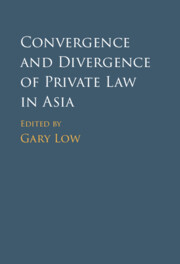Book contents
- Convergence and Divergence of Private Law in Asia
- Convergence and Divergence of Private Law in Asia
- Copyright page
- Dedication
- Contents
- Tables
- Contributors
- Acknowledgments
- Abbreviations
- 1 Introduction
- 2 Uniform Law and the Production and Circulation of Legal Models
- 3 Convergence, Divergence and Diversity in Financial Law: The Experience of the UNCITRAL Model Law and Cross-Border Insolvency
- 4 The New York Convention and the UNCITRAL Model Law on International Commercial Arbitration: Existing Models for Legal Convergence in Asia?
- 5 Convergences and Divergences: Comparing Contractual and Organizational Models in International Regulatory Cooperation
- 6 Law as a Market Standard: Voluntary Unification in Contract and Company Law
- 7 Is the Harmonisation of Asian Contract Law Possible? The Example of the European Union
- 8 The Presumption of Regularity in Chinese Corporate Contracting: Evidence and the Prospect of Regional Convergence
- 9 Mind the Gap: Studying the Implementation Discrepancy for the ASEAN Economic Community
- 10 The Rule of Law as Key to the ASEAN Legal Order: How Can It Be Ensured?
- 11 How Asian Should Asian Law Be?
- Index
6 - Law as a Market Standard: Voluntary Unification in Contract and Company Law
Published online by Cambridge University Press: 17 February 2022
- Convergence and Divergence of Private Law in Asia
- Convergence and Divergence of Private Law in Asia
- Copyright page
- Dedication
- Contents
- Tables
- Contributors
- Acknowledgments
- Abbreviations
- 1 Introduction
- 2 Uniform Law and the Production and Circulation of Legal Models
- 3 Convergence, Divergence and Diversity in Financial Law: The Experience of the UNCITRAL Model Law and Cross-Border Insolvency
- 4 The New York Convention and the UNCITRAL Model Law on International Commercial Arbitration: Existing Models for Legal Convergence in Asia?
- 5 Convergences and Divergences: Comparing Contractual and Organizational Models in International Regulatory Cooperation
- 6 Law as a Market Standard: Voluntary Unification in Contract and Company Law
- 7 Is the Harmonisation of Asian Contract Law Possible? The Example of the European Union
- 8 The Presumption of Regularity in Chinese Corporate Contracting: Evidence and the Prospect of Regional Convergence
- 9 Mind the Gap: Studying the Implementation Discrepancy for the ASEAN Economic Community
- 10 The Rule of Law as Key to the ASEAN Legal Order: How Can It Be Ensured?
- 11 How Asian Should Asian Law Be?
- Index
Summary
Why a need should exist for hundreds of different contract laws capable of regulating a sale of goods is far from obvious. Attempts have been made to cut back and tackle the incongruities between different legal regimes. This contribution offers a conceptual framework for thinking about the variety of private laws, the need for unification, and ways to achieve it. The economics of network effects explain why standardization is often beneficial and how it can be accomplished—or missed. This chapter suggests predictions about the scope of market standardization in two particularly important areas, contract law and company law. One policy implication is that international standardization does not depend on crafting uniform law. The laws of national jurisdictions can be suitable as market standards for cross-border transactions. This adds a new perspective to the continuing debate about regulatory competition between jurisdictions: The winners of the race are decided as much by network effects as by differences in the substantive quality of their laws. Better law standardization can be a possible and desirable outcome of jurisdictional competition. It deserves careful consideration whether enacting international uniform law promises a significant improvement over jurisdictional competition that justifies the cost.
- Type
- Chapter
- Information
- Convergence and Divergence of Private Law in Asia , pp. 105 - 134Publisher: Cambridge University PressPrint publication year: 2022



